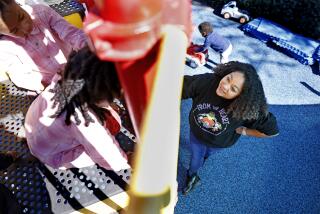Commentary : Men in Day Care: Guilty Without Trial
- Share via
Maybe I was the only man in Orange County who had trouble last Sunday digesting the words of my colleague, Dianne Klein.
But I doubt it. It would be even more heartening if many women, especially those who consider themselves feminists, also found her column troubling.
Writing in the aftermath of the not-guilty verdicts in the McMartin Pre-School child molestation case, Klein at first admitted only to what sounded like some reasonable parental biases.
She wrote that even after the McMartin jury’s verdict, she wouldn’t want Ray Buckey, one of the acquitted defendants, caring for her 3-year-old daughter. Fair enough, given the complexity and uncertainties raised by the case and the jurors’ own post-verdict comments.
But then Klein aired it all. Raising the question herself as to why she wouldn’t entrust Buckey with her daughter, Klein wrote: “High on the lists of my reasons: He is a man.”
She went on to say: “This is not an admission that I am proud of. It is sexist, to be sure, and hypocritical.” Later in the column, she added: “Why would a man choose (her italics) to work in day care? . . . Most child molesters, I remind myself, are men.”
The headline over her column read, in part: “Fear Beats Logic . . . “
Indeed.
If you’re a man working in an Orange County day-care center, you now know how blacks felt in Boston’s Mission Hill district in the weeks after Charles Stuart said a street punk killed his pregnant wife. In other words: You’re black in Mission Hill; you’re a suspect, pal.
And just as it was dehumanizing in Boston, it’s dehumanizing here.
Stereotyping often comes fully equipped with rationales. In Boston, it was that blacks account for a disproportionately high number of urban crimes. That is true, officials there said.
In the day-care matter, it is that men account for most molestations. Again, true.
But stereotypes are the handmaidens of ignorance. As Klein conceded, her position is “sexist and hypocritical.” One might ask why, if she harbors such thoughts, she didn’t just keep them to herself, as many of us do when our better instincts are temporarily overrun. That isn’t an irrelevant point, because one way stereotypes are perpetuated is by otherwise-intelligent people giving them credence.
But I digress. Just how much logic rests behind the fear of men in day-care situations?
James Peters, senior attorney for the National Center for Prosecution of Child Abuse in Alexandria, Va., cited a study by the Family Research Laboratory at the University of New Hampshire. Peters, whose own organization is often called on by local prosecutors to handle molestation cases, called the New Hampshire center and its director one of “the most prolific and respected in the field of sex abuse.”
“Certainly the conventional stereotype is that most molesters are men, and that is an accurate stereotype,” said Peters.
But the New Hampshire study of day-care centers, which looked at 270 cases nationally, involving 1,639 children over a three-year period in the mid-1980s, showed that 40% of the molesters were women, Peters said.
The study also revealed, Peters said, that in 38% of the cases the abuser wasn’t a day-care provider at all but a relative of a center official or someone else associated with the center who had access to the children.
Asked about the male bias in day care, David Finkelhor, co-director of the New Hampshire laboratory, said: “Frankly, a man who would work in day care in this day and age, and a day care that would employ men in this day and age, might well be exactly the kind of people you’d want to have taking care of your child.” Finkelhor’s point is obvious: To pursue the job in the face of the societal stigma suggests someone who “might well have an extraordinary commitment to children.”
There are some realities here.
Yes, men commit a disproportionately high number of molestation crimes. This, by the way, is true at home as well as at the day-care center.
Yes, day-care operators must be diligent in screening and hiring.
Yes, parents should spare nothing in thoroughly checking out a day-care staff. When it comes to children, you can’t afford to make a mistake.
But no, no, no is my response to whether male day-care workers should automatically be held hostage by the ignominious acts of other men. It is wrong, wrong, wrong, and it’s a social sin to exclude and stigmatize people solely by their career choices or personal aspirations.
In its mundane form, that kind of bigotry deprives people of jobs; in its more insidious form, it deprives them of their humanity.
As adults, we’re called upon all the time to use our intellect and human experience to cut through irrational fears. To Klein’s question of Why would a man choose to work in day care? I humbly suggest two not so far-fetched possibilities:
* Perhaps, like the women employed in the field, he’s just trying to make a living.
* Perhaps, like the women employed in the field, he’s interested in early-childhood development.
And just as being black and walking the streets in Boston isn’t a crime, neither is either of those.
More to Read
Sign up for Essential California
The most important California stories and recommendations in your inbox every morning.
You may occasionally receive promotional content from the Los Angeles Times.













